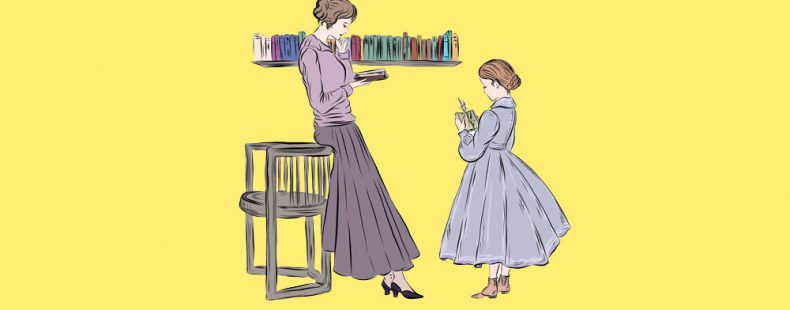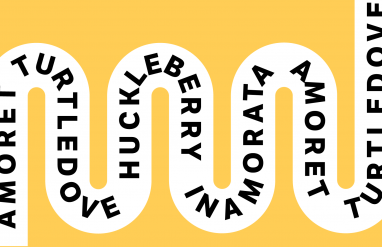Familial relationships are at the core of most great works of literature, and so it is of little surprise that the canon is full of mothers. Motherhood—its complexity, its joys, and its demands—are examined in stories as varied as To The Lighthouse and Matilda (yes, that Matilda). In celebration of Mothers Day, let’s take a look at quotes from and about some of the most memorable mothers in literature. These are women who love their children and try to do their best by them, even under difficult circumstances. Beyond being simply “strong women,” they are complex characters with unique personalities. Their tenacity, intelligence, and kindness are what make them enduring figures to this day.
1.
I know, by experience, how much genuine happiness can be had in a plain little house, where the daily bread is earned, and some privations give sweetness to the few pleasures. —Mrs. March, Little Women by Louisa May Alcott (1868–9)
privations
One of the most famous mothers in American literature is Mrs. March from Little Women or “Marmee,” as her children call her. She is patient, generous, and gives sound advice. Here, she advises one of her daughters that privations, “lack of the usual comforts or necessaries of life,” can make the good times seem that much better. Privation shares a Latin root with the English private, prīvātus, meaning “taken away.”
2.
You’re much too straightforward to be able to pretend to be what you aren’t. —Dr. Kate Murry, A Wrinkle in Time by Madeleine L’Engle (1962)
straightforward
Many of the best mothers in literature come from stories for children or young adults, such as Dr. Kate Murry in Madeleine L’Engle’s A Wrinkle in Time. A brilliant scientist and hard worker, Dr. Murry takes time to comfort her daughter, Meg, who has gotten into a fight with a bully. She describes Meg as straightforward, a word that is used figuratively to mean “free from crookedness or deceit; honest.” The literal meaning of straightforward is “going or directed straight ahead.”
3.
Momma reminds me to breathe, the same way she did before I outgrew asthma. I think she stays in my room the whole night, ’cause every time I wake up, she’s sitting on my bed. —Lisa, The Hate U Give by Angie Thomas (2017)
breathe
In the wrenching coming-of-age novel The Hate U Give, narrator Starr Carter describes her mother, Lisa, as a constant source of care, support, and attention. In this scene, Starr describes how her mother watched over her during the night, watching her breathe, a verb that means “to take air into the lungs and expel it.” The verb breathe is easily confused with the noun breath, “the air inhaled and exhaled in respiration.”
4.
I’ll tend her as no mother ever tended a child, my daughter. Nobody will ever get my milk no more except my own children. I never had to give it to nobody else–and the one time I did it was took from me–they held me down and took it. Milk that belonged to my baby. —Sethe, Beloved by Toni Morrison (1987)
tend
Literature gives us a glimpse into the ways mothers make choices for themselves and their children under difficult circumstances. One such novel is Beloved by Toni Morrison that tells the story of a former slave, Sethe, who is haunted by the memory of a daughter she killed so that she would not have to be a slave. When a new girl named Beloved turns up, Sethe says she will tend her. Tend is a verb meaning “to look after; watch over and care for.” Generally in this sense it is used with a preposition (tend to), but the phrasing here represents Sethe’s African-American Vernacular English dialect, which does not require it.
5.
Her mother had said the words she longed to hear. Her mother could not get along without her. She felt warm, and safe and comforted. —Mrs. Quimby, Ramona and Her Mother (1979)
comforted
Ramona, the impish protagonist of Beverly Cleary’s beloved series about the Quimby family, often feels overshadowed by her older, teenage sister, Beezus—especially when it comes to bonding with her mother. Ramona and Her Mother finds Ramona exploring the dynamics of the relationships between the three women, and Ramona learns to appreciate her own unique connection with her mother, which provides comfort. This word, used as both a noun or verb, can mean “to soothe, console, or reassure; bring cheer to.”
6.
(C)hildren never forget. For this reason, it was so important what one said, and what one did, and it was a relief when they went to bed. For now she need not think about anybody. —Mrs. Ramsay, To the Lighthouse by Virginia Woolf (1927)
relief
In Woolf’s To the Lighthouse, we see the complex inner world of perfect mother Mrs. Ramsay. Despite loving her children, in this passage, she describes the moment when the children go to bed as a relief. Relief means “alleviation, ease, or deliverance through the removal of pain, distress, oppression, etc.” Relief ultimately comes from Latin relevāre, meaning “to reduce the load of, lighten.”
7.
How foolish to think you can tell your children about yourself before they’re at least fifty. To ask to be seen by them as a person and not as a function. —Leda, The Lost Daughter by Elena Ferrante, translated by Ann Goldstein (2008)
function
Leda, the main character in The Lost Daughter, is a complicated mother, although she loves her daughters very much. In this quote, she thinks about how difficult it is for children to see their mothers as people rather than as a function, “the kind of action or activity proper to a person, thing, or institution.” In other words, children tend to see their mothers as Mom before anything else.
8.
I would give up the unessential; I would give my money, I would give my life for my children, but I wouldn’t give myself. —Edna Pontellier, The Awakening by Kate Chopin (1899)
unessential
The Awakening‘s Edna Pontellier is a loving, dedicated mother, but even she has her limits, as she attempts to describe to her friend in this quote here. The first things she would give up for her children are, quite understandably, the unessential, “not of prime importance; not indispensable.” She considers her life unessential, but not herself, an important distinction.
9.
His mother’s sad heart, and her greed, drove her from her den on the dangerous Pathway of revenge. —Grendel’s mother, Beowulf (c. 700–1000 CE)
revenge
Some of the oldest known stories and myths tell the tales of strong, if dangerous and oft-maligned, mothers. One of those is the monster Grendel’s mother in Beowulf, who swears revenge on warrior Beowulf and his men after he kills her son. Revenge means “to exact punishment or expiation for a wrong on behalf of, especially in a resentful or vindictive spirit.” For more on the differences between revenge, reprisal, retribution, and vengeance, read our synonym study here.
10.
There is little point in teaching anything backwards. The whole object of life, Headmistress, is to go forwards. —Miss Honey, Matilda by Roald Dahl (1988)
object
Not all literary mothers are biological mothers. There are adopted and chosen mothers to be found as well, such as the caring and generous teacher Miss Honey in Roald Dahl’s Matilda. Miss Honey stands up for all the children in school to the cruel headmistress. Here, she tells the rude headmistress that the object, or “the end toward which effort or action is directed,” of life is to progress. Object comes from the Latin objectum, “something thrown down or presented (to the mind).”
11.
It’s only three weeks since she came, and it seems as if she’d been here always. I can’t imagine the place without her.—Marilla Cuthbert, Anne of Green Gables by L. M. Montgomery (1908)
imagine
Another literary legendary adoptive mother is Marilla Cuthbert from Anne of Green Gables. Although Marilla never expected to take in a girl—and the high-spirited Anne no less—she quickly warms to her new daughter and learns to appreciate her for who she is. In a few weeks, she remarks to her brother that she cannot imagine Green Gables without Anne. Imagine here means “to form a mental image of.” As you may have guessed, imagine shares a Latin root with the English word image.
Literature gives a glimpse into motherhood, how it changes mother and child, and what the inner life of mothers may be like. These are just a few notable examples. The next time you read a novel, take note of the mothers in the story. What are their dreams and hopes? How are they described? Do any of them remind you of one of these notable fictional moms?













